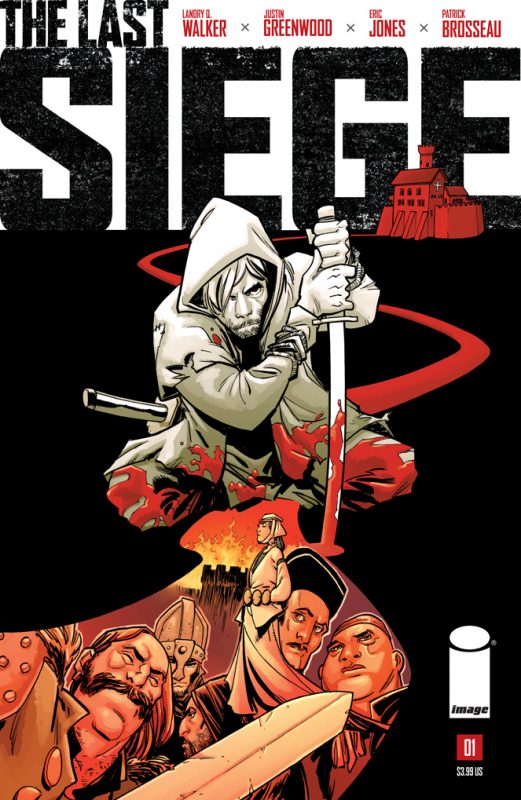When Branwyn Bigglestone announced (more like mentioned, really) that she was leaving her accountancy position at Image Comics to do a Masters in Accountancy, it was picked up quickly by her peers who knew what an asset she’s been for the company. Having previously heard from David Brothers and others in the know about just how vital Bigglestone’s (ex)role is, an exit interview seemed like an opportunity too important to miss.

We’ve heard for ages that you’re Image’s “secret weapon” and that all the creators love you. Can you explain what your role was at the company, and how it had direct relevance to those creators? Accountancy isn’t the first thing a lot of people would think of when they consider “comic book publishing.” is that a huge oversight?
Awww that’s really great to hear! And a fantastic way to butter me up before you go in for the kill!
In all seriousness though, I think that’s exactly part of the problem with the comic book industry, and it’s something that I could go on about for a while, but I’ll try to stay focused.
Generally speaking, this industry is not well-known for financial transparency. Every artist, writer, colorist, letterer, designer, or contract employee probably has at least one story about being underpaid, paid late, or not paid at all. Some of that can be chalked up to something innocent like folks on the publishing side being overworked or ill, but other times it’s due to downright dastardly reasons.
I’ve been told by some people that I’m the only accounting person they’ve worked with in the industry who actually replied to emails and took the time to make sure folks understood the reports they received. I wasn’t always able to do it as quickly as we all would have liked, but it never occurred to me to do otherwise. As much as I love to hear the compliments from folks on my job performance and the trust they have in me, the flip side is I get real mad when I hear about the problems they’ve had elsewhere.
Bottom line is: every single thing a publishing company does will go through the accounting department. Every single thing. It would be foolish not to bring the people who are doing that vital work into the decision making process, and to not give them the support they need to do the job in a timely and thorough manner. So yeah, if people aren’t thinking about that, it is a huge oversight. But I get it. Accounting ain’t glamorous, and the average person would much rather think about clever dialogue and beautiful pictures. And why wouldn’t they?
You’ve been at Image for a long time, I think. When did you come on board? And how? Were you hired for your comics knowledge, or was it all about the numbers?
After years of working in the financial services industry, I wanted no more of it. While I was trying to figure out what the hell I wanted to do with my life next, I did part-time bookkeeping at Comic Relief: the Comic Bookstore in Berkeley, where I had worked after high school and stayed peripherally connected to over the years. When I was ready to move on to a full time job, Comic Relief’s owner, Rory Root, recommended me to Eric Stephenson. Right place, right time!
My major in college was Social Sciences: Interdisciplinary Studies. Other than the comic book shop, the work experience I stumbled into was project and financial risk management. I had not done anything like run an accounting department before, but what I lacked in formal education, I made up for with related experience and an understanding of the comic book industry. Image hired me in August 2007.
Another thing that I brought to the job was a passion for creator rights. You can’t be fully successful at a place like Image unless you are guided by the creator ownership principal and respect everything that it means. It isn’t just a question of editorial interference. Creators have a right to be involved in the marketing of their books and to receive transparent explanations of the accounting. I loved paying people because it was their money, and they should reap the net profit of all their hard work and talent. It’s definitely more time consuming of a process than a company-centric approach, but it’s something that definitely attracts creators to Image as a publisher they can trust. And I embraced the value I brought to the company in that regard. But yeah, time consuming. Finding that balance can be a challenge.
It’s certainly something that’s paid off, though. I recall noticing your name in the thank yous on the last project Fil Barlow put out through Image, and that really made an impact on me. This sounds super rude, and I’m very sorry, but it was a new idea that an accountant could be so directly relevant to the creative experience. It really started me thinking about publishing creative work as a whole process, rather than the more modular creatives/editorial/unrelated office workers vision that I think publishers tend to propagate.
From that perspective, what sort of advice do you think might be useful to a cartoonist or creative just getting into professional publication, accountancy-wise? Is it the kind of area you can give advice for?
There’s no need to apologize; this industry has clearly delineated who counts as a comic book “professional” and who doesn’t. The San Diego Comic-Con website states,
“Unfortunately, we cannot extend complimentary professional badges to support staff, including sales, marketing, accounting, managers, testers, analysts, administrative staff, IT, facilities, operations, and others who are not directly involved in the creative process.”
I get that the line has to be drawn somewhere, but I also think that the devaluation of certain types of labor is bullshit. Anybody who works in an office knows what a huge difference having talent, knowledge, and dedicated work ethic in those roles makes. I don’t know what the answer is, but I really appreciate you seeing beyond that delineation and reaching out.
I definitely have advice for creatives and freelancers!
Be professional with everybody, not just the bigwigs. There are some folks who were nice to me and other upper management, but treated the admins and production artists like they were less than. People who do that are trash.
Ask questions! If you don’t understand a report, if you think you were underpaid, or need clarification on anything else, ask. You have a right to know; just make sure you do it politely. (See above; don’t be trash.)
Work out money stuff with your collaborators as early in the process as you can. How will the split work? Are page rates and/or advances in play? I’ve seen some creators treat an advance from a publisher like a page rate, while others want it deducted from royalty payments. Make sure you’re in agreement on all of this before you’re hip deep in work. In fact, make sure you’re on the same page with your collaborators about what the collaboration itself will look like before the work has even begun.
Don’t assume. Policies and personnel change. Standard page rates change. Don’t assume that a page rate will be the same as it was on your last project with that person or publisher. Don’t assume that reports and support from a publisher will be exactly the same from one month to the next unless it’s embodied in a contract.
Get a contract.
Give credit where credit is due.
Speaking of credit, I want to say that I have been blessed with a number of great accounting assistants over the years, and everything that I was able to accomplish was done with them and because of them. Some of these folks are better known for other roles they’ve played at Image after being promoted, but they started in accounting: Tyler Shainline, Sarah deLaine, Emily Miller, Sarah Mello, Leanna Caunter, and Sue Korpela. I would feel like a jerk if I failed to acknowledge them here.
You honestly sound like a great person to work with. Just for absolute clarity, because I want this to be accessible for people with no relevant experience at all, here are some basic functional questions:
What is/was your first point of contact with a new creative team being published by Image?
You mention reports sent to creative teams. Can you explain the importance of those? How often were they sent, and what were the basics covered?
Is there another department accounting works most closely with, or is that closest collaboration with the teams producing the books?
Do you generally communicate with a whole creative team, or is it more regularly one designated team leader?
And a last main question, to cap: you’ve left Image, but have you left comics behind for good?
Well thank you! I hope I have been.
To answer your questions, keeping in mind that my only direct experience has been with Image Comics…
It depended on the series or creative team. Sometimes introductions were appropriate long before the book was even announced. Other times, only when it was time to send the first accounting report. Some books are going to be simpler accounting-wise than others, and a creator’s relative experience in the industry comes into play of course.
We would send an initial accounting report a couple of months after the on sale date of a book, and then bi-annual reports after that. Sales figures, income, and costs were all included. Costs can go beyond printing and shipping, and may include things like various obtuse book market fees. I don’t like the idea that any publisher would conceal sales data from a creator, and in creator-owned work, what the expenses are. If your $3.99 comic book sells 10,000 copies, but the publisher only sends you $500, you have a right to know how they arrived at that figure. Maybe there was a keying error somewhere along the way. Maybe your publisher is shady. Or maybe you should have listened when the production department warned you that all of the extravagant printing options you insisted on were super expensive and would eat into your profits, so really you only have yourself to blame.
Whatever the reason, if it’s your book, you have a right to know if for no other reason than that you can make informed decisions on your next project. There’s a lot more that goes into producing and selling comic books than just a printing bill.
It’s hard to say because of what I mentioned earlier about how everything a company does goes through the accounting department eventually. We worked with everybody! Creators, printers, and other vendors, Diamond Distributors, and internally with the Sales and Production departments, and the Publisher.
This is another one where it depends on the creative team. In some cases, it was a single point of contact, even if several people worked on the book. In other cases, it was every single person who contributed any kind of labor to the process. Then there are the folks who would rather eat glass than have to be subjected to boring spreadsheets, so will actively avoid communicating with accounting. Quite understandably, they’re in the comics business for love of comics, not love of business.
I definitely have not left comics! I’ve done some freelance editing over the years (Alpha Girl, Danger Club, and G-Man, all published by Image), and have three more titles coming up. Two haven’t been announced yet, but The Last Siege was announced at the last Image Expo, with the first issue coming out on May 30.

The team on that is:
Writer: Landry Q. Walker
Artist: Justin Greenwood
Colors: Eric Jones
Lettering: Patrick Brosseau
Designer: Keith Wood
Editor: Branwyn Bigglestone
School is now my focus, but how could I walk away completely from the glamour and good times of comic books?

